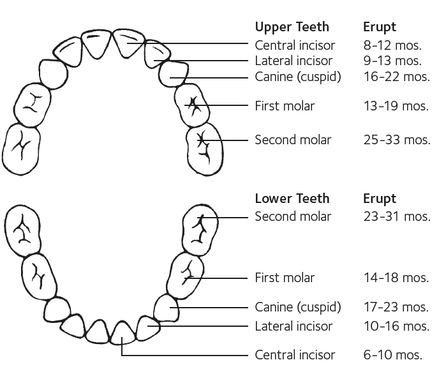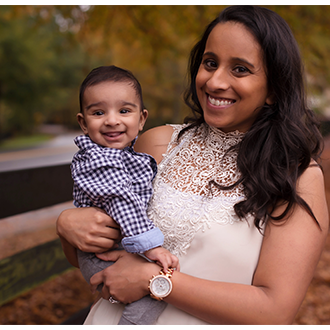Teething
Ever wonder why your baby is being fussy and cranky? If your baby is around 4-7 months old he/she may be teething (each baby is different so timing of when teeth appear can differ child to child). Teething can be very painful for your little one and can cause some disturbance in his/her daily life.
It's important to look for signs of teething if your baby is around 4-7 months old:
Some parents believe that teething can also cause a higher fever, diarrhea, or a cold, however science has not proven that this is true. If your baby does have a higher temperature and has any other symptoms of being sick, please call your doctor to make sure there is not an underlying issue other than teething.
It's important to look for signs of teething if your baby is around 4-7 months old:
- Fussy/crying a lot more
- Swollen, red tender gums
- Lots of drool
- Baby wants to chew on hard objects
- Changes in eating or sleep
- Slight temperature increase (no more then 101° F / 38.3°C)
Some parents believe that teething can also cause a higher fever, diarrhea, or a cold, however science has not proven that this is true. If your baby does have a higher temperature and has any other symptoms of being sick, please call your doctor to make sure there is not an underlying issue other than teething.
How to Help with Teething
There are a few things that you are able to do to help your baby with teething. One thing I found that helped in the beginning of teething doesn't necessarily work as the baby gets older.
*In 2018, the FDA warned about how teething gels, creams, and powders can cause serious health side effects, including death in children (mostly under the age of 2). Teething remedies containing Benzocaine should not be used for temporary relief. The FDA urged any OTC (over the counter) products containing Benzocaine be removed. Read full article
- Cold objects - cold items (pacifiers, solid teething rings, clean washcloth) help soothe the swollen gums. Do NOT freeze teething toys as the extreme cold can cause more pain for your baby.
- Rub your finger gently on the gums
- If your baby is able to eat solids, give him/her cold foods (yogurt, cold pureed fruits), or if your baby is able to chew correctly give him/her something that is cold and hard (teething biscuit or a carrot)
- Pain medication - this should only be given if your baby is older than 6 months, and please consult your doctor before you give medication to your baby. Some doctors will recommend giving acetaminophen or ibuprofen to help with the pain and fever. DO NOT give your baby aspirin.
*In 2018, the FDA warned about how teething gels, creams, and powders can cause serious health side effects, including death in children (mostly under the age of 2). Teething remedies containing Benzocaine should not be used for temporary relief. The FDA urged any OTC (over the counter) products containing Benzocaine be removed. Read full article
Teeth Care
Once you start seeing teeth budding out, it is time to start taking care of those new pearly whites. Start brushing your baby's teeth with a soft bristle child's toothbrush and a fluoride based child toothpaste (we started with the baby banana toothbrush that was rubber and then moved to a bristle toothbrush once our baby had a few teeth). When your baby's teeth are budding out, you will also want to stop your baby falling asleep with a bottle in his/her mouth. This will help prevent cavities. Going to the dentist is always a debate - some doctors say you will need to go as soon as teeth start appearing while others say to wait till your baby is 2. It is important to have your baby's teeth checked by the dentist to make sure the teeth are growing correctly and there is no decay.
Teeth Development
Each baby is different on when their teeth will develop. Be prepared for teeth development from 4 months to 24 months.



